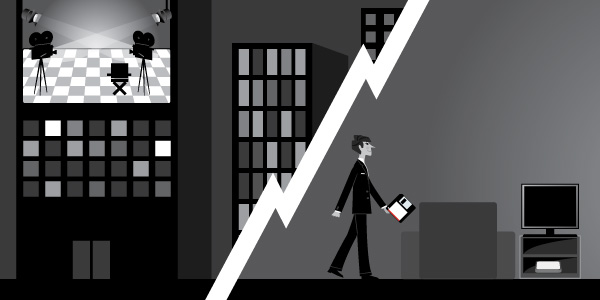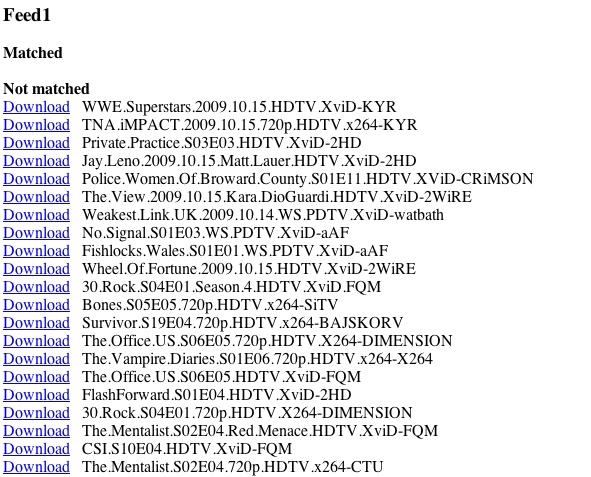
I’ve been angling to get rid of my TiVo and cable for some time now and I believe I’ve finally figured out a solution that works best for me. It involves a lots scripting, Sabnzbd, and HandbrakeCLI and I’ll tell you what I ultimately did next week once it’s stable but it seems to be working as well as can be expected for these sorts of hacks.
I posit that the TV industry is about to face the same threat dealt the music and movie industries but they still have a chance to make things better for themselves when the world changes around them. First, let’s rehash the old arguments.
What I’m doing is downloading TV shows and sending them to a media player near my TV. I’m doing this because there exist two separate infrastructures that interface imperceptibly at one key point – the official cable and online distribution networks and the shady underworld of pirate distributors. Right now that interface is a trickle, but it will soon be, pardon the pun, a torrent.
The first infrastructure is the studio system. While I’m talking specifically about TV here, we can also extrapolate to talk about movies and music. This infrastructure is based on the advertising or distribution model in that they make all their money placing advertisements around their content or by placing their content onto physical media. But what is important to note is that the TV industry is in a completely different business from the music and movie industry. They’re not “selling” a product. They’re selling the space around a product. They they commission artists to make that product better in hopes of raising the price of the space around that product. They sell DVDs, sure, but that’s a sideline.

But when I take that content out of its context, like meat out of an oyster shell, I strip out their value and shuck the rest. But technology has outstripped that analogy and television has evolved into a processable set of events – shows – whereas before it was an event, each show linked together into infinity.
TiVo, to continue the analogy, created a way to sell jarred oyster sauce. The device contained the content, sure, but it tried to keep some of the advertising intact. However, what I’m attempting to do buffets into an entirely new infrastructure, one none of us wholly understand.
It consists of two disparate parts. The first is a shady underground that can offer these shows, stripped of commercials, a few minutes after they’ve aired. How they do it is a topic for another story, but needless to say popular shows are available in less than ten minutes after they air on the Eastern Seaboard. It is a testament to the dedication of a few TV lovers that these shows are available, for free, as they happen.
Then we have the web arms of the major TV studios as well as the clips cable stations post on their sites. These are, to a lesser extent, a re-canning of those same oysters in the hopes that the shorter advertisements wrapped around them will maintain the revenue offered by TV broadcasts.
So what’s my point? First, I believe some media will survive the move to the web better than others. Book publishing, for example, may change formats but the inherent problems of pirating a physical book make them weak targets for piracy. I also believe that the medium of television is also not conducive to large scale piracy because there is so much of it. I can shuck all the oysters I want but there will still be 24-hour news channels, old movie networks, and sitcoms that someone out there will watch even if the pirates are uninterested in recording and distributing them.
Now, back to that interface between the two worlds. Because pirates can’t steal everything at once there is no impetus to stop up this hole. The highly regimented and very well organized system of content capture that is going on exists as a labor of love and not as a money making venture. It allows guys like me, guys who no longer want to be beholden to a wonky TiVo, for example, to get HD content quickly and easily. However, there are more guys like me every day. To say that television as we know it won’t exist in a decade is quite far fetched but it is a possibility. How, then, should a TV broadcaster react?
First, I think TV broadcasters need to take a page from the pirates playbook and make their hit shows available online in downloadable form sooner than later – and not on iTunes for $2.99 an episode. The process I went through was relatively painless but decidedly nerdy. The next generation, however, will find new and better ways of doing the same thing, thereby stripping out the content with reckless abandon. TV studios still have some time to save their skins, just like the book industry, but it won’t be long before something comes along and ruins the party. They need to do what the music industry didn’t do – make getting sanction, high quality content convenient. It took me a week to set up my little Rube Goldberg DVR but there’s no telling how long it could take someone with a little more savvy.
Why not, for example, offer TV subscriptions to individual series. The era of channel surfing is almost near its end and discovery of new content through mere chance will soon be gone. This would allow for absoltute control over a series and reward popular series month after month. Sadly, cable companies just won’t do this. As Doug noted in our chat room “Cable companies keep saying a la carte wouldn’t work but in reality they’re saying it wouldn’t work for them because its too much work.”
Second, television needs to play to its strengths. As Harry McCracken pointed out during the balloon-boy debacle, the first on the scene wasn’t some blogger with a Flip but the television news crews with their trucks, helicopters, and satellite dishes. But even in the vacuum created by the death of local newspapers it seems that local TV stations aren’t able to appreciate their value. For example, I was in Columbus, Ohio a few months ago and I saw the same reporter on two different channels reporting on essentially the same thing. This sort of cost-cutting is detrimental to the brand and is cheapening TV journalism. We all laugh at the 24-hour news channels and their bloviating blowhards, but those are the news networks of choice for millions of people daily. There is value there. TV studios need to give us this content in a way that makes it a win-win for all parties involved. If not, it will be a lose-lose as their content is stripped and stolen and their revenues tank over the next few years.